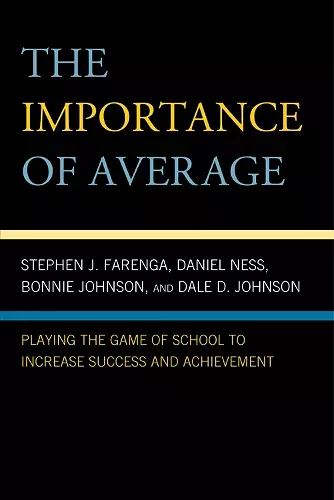The Importance of Average
Playing the Game of School to Increase Success and Achievement
Daniel Ness author Dale D Johnson author Bonnie Johnson author Stephen Farenga author
Format:Paperback
Publisher:Bloomsbury Publishing PLC
Published:26th Apr '11
Currently unavailable, and unfortunately no date known when it will be back
This paperback is available in another edition too:
- Hardback£130.00(9780742570122)

The Importance of Average calls attention to the policies and practices that discriminate against the silent majority of students in the American educational system. Arguments presented emphasize the collateral damage caused to average students by legislative mandates, administrative policies, teaching practices, parenting beliefs, and adherence to strict psychological constructs. Each of these factors has created a pervasive psycho-educational belief of average ability. The authors challenge what they consider as a pseudo-definition of 'average' that was brought about as an attempt by policymakers to test their way out of addressing the true inequities found in society. Further, the authors identify how educational policymakers have sacrificed the education of an entire class of students by creating the illusion that underachievement can be eliminated simply through lowering standards and examination pass rates. In chronicling the plight of average students, the authors capture the emotions and attitudes of teachers, parents, and students whose frustrations have been set aside in order to meet other special interests. The authors explore methods that provide students of average knowledge in any given area with the appropriate tools necessary for succeeding in school. Finally, the authors argue that there is no such thing as 'average' intelligence.
The Importance of Average by Farenga, Ness, Johnson, and Johnson builds a sensible argument for paying more attention to the large group of nearly invisible learners in our schools. The authors' readable summaries of intelligence, motivation, and learning theories provide just enough background for adults to infuse a renewed sense of awe and wonder into learning experiences with children. A rich variety of practices celebrate creativity and discovery in areas of literacy, mathematics, science, and social studies/citizenship. This book is a must read for those who want to encourage meaningful learning among their children rather than simple bubble answer skills. -- Reese H. Todd, Texas Tech University
Are schools established to create mediocrity? Are we preparing students to become empowered citizens? Do students find meaning in what they are asked to do? Are average students at risk? This provocative book tackles these critical questions and raises others. It reminds us that, whether intended or not, an entire group of students is being ignored and it highlights the collateral damages caused to average students through legislation, school policies, teacher practices and parenting beliefs. Through cogent discussions of intelligence, motivation, and success in schools, the authors rouse readers to consider a new conception of intelligence and act on behalf of children considered average by our schools. -- Julie Rainer Dangel, Georgia State University
Farenga, Ness, Johnson, and Johnson (all, Dowling College) present a powerful argument on behalf of the 'average' learner who is either ignored or overlooked in the US educational system of the late-20th and early-21st century. Deficit (crisis) model educational fix-it programs associated with No Child Left Behind, Gifted and Talented Education, and the Individuals with Disabilities Education Act focus money and attention on learners who are either at risk of failure or in need of challenge. The reliance upon psychometric bubble testing to determine success or failure of the educational system is taken to task. This book picks up where Stephen Jay Gould's Mismeasure of Man (CH, Dec'96, 34-2458) leaves off and offers ideas for challenging and enhancing the education of all students (especially the vast majority of "average" learners) in US schools. It offers chapters on the development of core skills in mathematics, science, and the social sciences. The authors conclude by arguing that 'average' intelligence is a myth, a social construct that testing creates rather than measures. Recommended. * Choice Reviews *
The Importance of Average is a counter-intuitive and compelling analysis of the unintended consequences, for the vast majority of America's public school students, of such attempts at reform as No Child Left Behind. What Farenga, Ness, Johnson, and Johnson have accomplished with this eye-opening account is of considerable importance and anything but average. -- James H. Borland, Columbia University
ISBN: 9780742570139
Dimensions: 232mm x 156mm x 18mm
Weight: 358g
224 pages